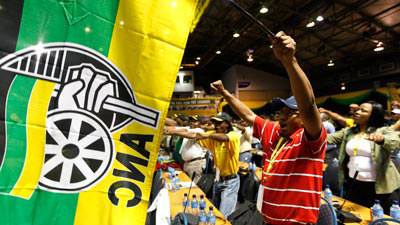The African National Congress (ANC) has been South Africa’s governing party, supported by its tripartite alliance with the Congress of South African Trade Unions (COSATU), the South African Communist Party (SACP) and the South African National Civics Organisation (Sanco), since the establishment of majority rule in May 1994.
It defines itself as a “disciplined force of the left”.
Members founded the organization as the South African Native National Congress (SANNC) on 8 January 1912 in Bloemfontein to increase the rights of the black South African population.
Following the seismic happenings around the 1960 Sharpeville massacre, the party was banned by the National Party (NP) government.
From 1961 organised acts of sabotage began, marking the emergence of Umkhonto we Sizwe (MK), the armed wing of the ANC.
The ANC was to be an underground and exiled organisation for the next 30 years.
In February 1990, the government unbanned the ANC and released Nelson Mandela and other political prisoners. The ANC was again able to openly recruit members and establish regional structures.
In the historic 27 April 1994 elections, the ANC won 62% of the vote. Nelson Mandela was subsequently inaugurated on 10 May 1994 as South Africa’s first democratic president.
Five years later in the 1999 general elections, the party increased its support to a percentage short of a two-thirds majority. After this election, Mandela’s former deputy Thabo Mbeki became president.
In the 2004 elections when the country celebrated ten years of democracy, the ANC achieved its best electoral outcome in post-1994 South Africa, clinching almost 70% of the popular vote. Mbeki went on to serve his second term as South African president.
In 2009 however, the party faced its first electoral decline post-1994, falling short of a two-thirds majority in the general elections. Before the poll, the ANC party machinery decided to ‘recall’ Mbeki, effectively denying the leader the completion of his second term. In protest, a number of cabinet ministers and deputy ministers resigned from the executive.
After much persuasion, some stayed on after ANC deputy president Kgalema Motlanthe was sworn in as Mbeki’s replacement until the 2009 elections. After the poll, Motlanthe was replaced by ANC president Jacob Zuma.
In the 2011 local government elections, the ruling-party again faced a decline, winning 64% of the overall vote. The ANC recently drew high praise when—in reference to the party’s upcoming 100th anniversary—United Nations Secretary-General Ban Ki Moon said the ANC was more than a political party.
“The ANC…is a movement…and a tangible expression of a vision. The commitment and sacrifice of its members led to the emancipation of a nation from racist colonial rule.”
He said the ANC’s success and power was, however, accompanied by great responsibility.
“The power of the ANC lies not just in the numbers of people who vote for it, but the vision that it stands for. This has always been the movement’s strength, and it is this vision that the world looks to now. The struggle for freedom, justice, human rights and against racism is a global battle. I see the ANC in the vanguard, not just in South Africa but throughout the continent and the globe.
Defeating racism, tribalism, intolerance and all forms of discrimination will liberate us all, victim and perpetrator alike,” the UN chief said.
– By


